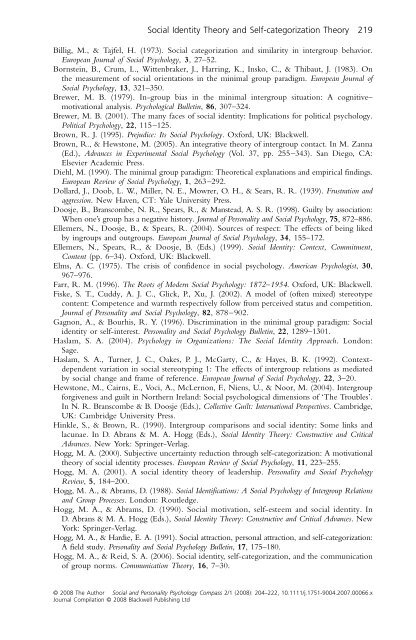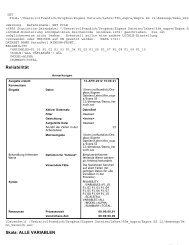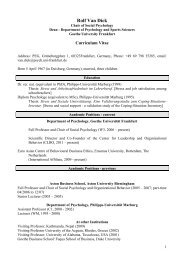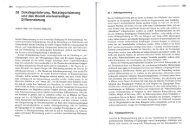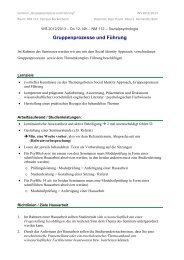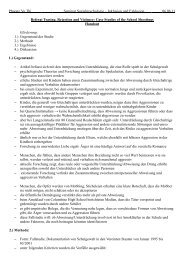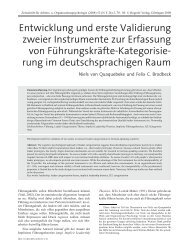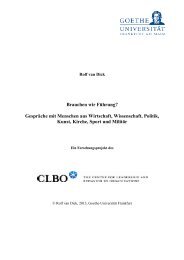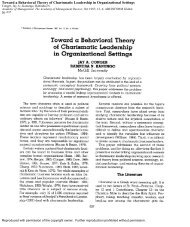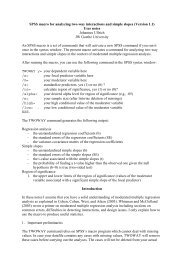Social Identity Theory and Self-categorization Theory: A Historical ...
Social Identity Theory and Self-categorization Theory: A Historical ...
Social Identity Theory and Self-categorization Theory: A Historical ...
You also want an ePaper? Increase the reach of your titles
YUMPU automatically turns print PDFs into web optimized ePapers that Google loves.
<strong>Social</strong> <strong>Identity</strong> <strong>Theory</strong> <strong>and</strong> <strong>Self</strong>-<strong>categorization</strong> <strong>Theory</strong> 219<br />
Billig, M., & Tajfel, H. (1973). <strong>Social</strong> <strong>categorization</strong> <strong>and</strong> similarity in intergroup behavior.<br />
European Journal of <strong>Social</strong> Psychology, 3, 27–52.<br />
Bornstein, B., Crum, L., Wittenbraker, J., Harring, K., Insko, C., & Thibaut, J. (1983). On<br />
the measurement of social orientations in the minimal group paradigm. European Journal of<br />
<strong>Social</strong> Psychology, 13, 321–350.<br />
Brewer, M. B. (1979). In-group bias in the minimal intergroup situation: A cognitive–<br />
motivational analysis. Psychological Bulletin, 86, 307–324.<br />
Brewer, M. B. (2001). The many faces of social identity: Implications for political psychology.<br />
Political Psychology, 22, 115–125.<br />
Brown, R. J. (1995). Prejudice: Its <strong>Social</strong> Psychology. Oxford, UK: Blackwell.<br />
Brown, R., & Hewstone, M. (2005). An integrative theory of intergroup contact. In M. Zanna<br />
(Ed.), Advances in Experimental <strong>Social</strong> Psychology (Vol. 37, pp. 255–343). San Diego, CA:<br />
Elsevier Academic Press.<br />
Diehl, M. (1990). The minimal group paradigm: Theoretical explanations <strong>and</strong> empirical findings.<br />
European Review of <strong>Social</strong> Psychology, 1, 263–292.<br />
Dollard, J., Doob, L. W., Miller, N. E., Mowrer, O. H., & Sears, R. R. (1939). Frustration <strong>and</strong><br />
aggression. New Haven, CT: Yale University Press.<br />
Doosje, B., Branscombe, N. R., Spears, R., & Manstead, A. S. R. (1998). Guilty by association:<br />
When one’s group has a negative history. Journal of Personality <strong>and</strong> <strong>Social</strong> Psychology, 75, 872–886.<br />
Ellemers, N., Doosje, B., & Spears, R. (2004). Sources of respect: The effects of being liked<br />
by ingroups <strong>and</strong> outgroups. European Journal of <strong>Social</strong> Psychology, 34, 155–172.<br />
Ellemers, N., Spears, R., & Doosje, B. (Eds.) (1999). <strong>Social</strong> <strong>Identity</strong>: Context, Commitment,<br />
Content (pp. 6–34). Oxford, UK: Blackwell.<br />
Elms, A. C. (1975). The crisis of confidence in social psychology. American Psychologist, 30,<br />
967–976.<br />
Farr, R. M. (1996). The Roots of Modern <strong>Social</strong> Psychology: 1872–1954. Oxford, UK: Blackwell.<br />
Fiske, S. T., Cuddy, A. J. C., Glick, P., Xu, J. (2002). A model of (often mixed) stereotype<br />
content: Competence <strong>and</strong> warmth respectively follow from perceived status <strong>and</strong> competition.<br />
Journal of Personality <strong>and</strong> <strong>Social</strong> Psychology, 82, 878–902.<br />
Gagnon, A., & Bourhis, R. Y. (1996). Discrimination in the minimal group paradigm: <strong>Social</strong><br />
identity or self-interest. Personality <strong>and</strong> <strong>Social</strong> Psychology Bulletin, 22, 1289–1301.<br />
Haslam, S. A. (2004). Psychology in Organizations: The <strong>Social</strong> <strong>Identity</strong> Approach. London:<br />
Sage.<br />
Haslam, S. A., Turner, J. C., Oakes, P. J., McGarty, C., & Hayes, B. K. (1992). Contextdependent<br />
variation in social stereotyping 1: The effects of intergroup relations as mediated<br />
by social change <strong>and</strong> frame of reference. European Journal of <strong>Social</strong> Psychology, 22, 3–20.<br />
Hewstone, M., Cairns, E., Voci, A., McLernon, F., Niens, U., & Noor, M. (2004). Intergroup<br />
forgiveness <strong>and</strong> guilt in Northern Irel<strong>and</strong>: <strong>Social</strong> psychological dimensions of ‘The Troubles’.<br />
In N. R. Branscombe & B. Doosje (Eds.), Collective Guilt: International Perspectives. Cambridge,<br />
UK: Cambridge University Press.<br />
Hinkle, S., & Brown, R. (1990). Intergroup comparisons <strong>and</strong> social identity: Some links <strong>and</strong><br />
lacunae. In D. Abrans & M. A. Hogg (Eds.), <strong>Social</strong> <strong>Identity</strong> <strong>Theory</strong>: Constructive <strong>and</strong> Critical<br />
Advances. New York: Springer-Verlag.<br />
Hogg, M. A. (2000). Subjective uncertainty reduction through self-<strong>categorization</strong>: A motivational<br />
theory of social identity processes. European Review of <strong>Social</strong> Psychology, 11, 223–255.<br />
Hogg, M. A. (2001). A social identity theory of leadership. Personality <strong>and</strong> <strong>Social</strong> Psychology<br />
Review, 5, 184–200.<br />
Hogg, M. A., & Abrams, D. (1988). <strong>Social</strong> Identifications: A <strong>Social</strong> Psychology of Intergroup Relations<br />
<strong>and</strong> Group Processes. London: Routledge.<br />
Hogg, M. A., & Abrams, D. (1990). <strong>Social</strong> motivation, self-esteem <strong>and</strong> social identity. In<br />
D. Abrans & M. A. Hogg (Eds.), <strong>Social</strong> <strong>Identity</strong> <strong>Theory</strong>: Constructive <strong>and</strong> Critical Advances. New<br />
York: Springer-Verlag.<br />
Hogg, M. A., & Hardie, E. A. (1991). <strong>Social</strong> attraction, personal attraction, <strong>and</strong> self-<strong>categorization</strong>:<br />
A field study. Personality <strong>and</strong> <strong>Social</strong> Psychology Bulletin, 17, 175–180.<br />
Hogg, M. A., & Reid, S. A. (2006). <strong>Social</strong> identity, self-<strong>categorization</strong>, <strong>and</strong> the communication<br />
of group norms. Communication <strong>Theory</strong>, 16, 7–30.<br />
© 2008 The Author <strong>Social</strong> <strong>and</strong> Personality Psychology Compass 2/1 (2008): 204–222, 10.1111/j.1751-9004.2007.00066.x<br />
Journal Compilation © 2008 Blackwell Publishing Ltd


